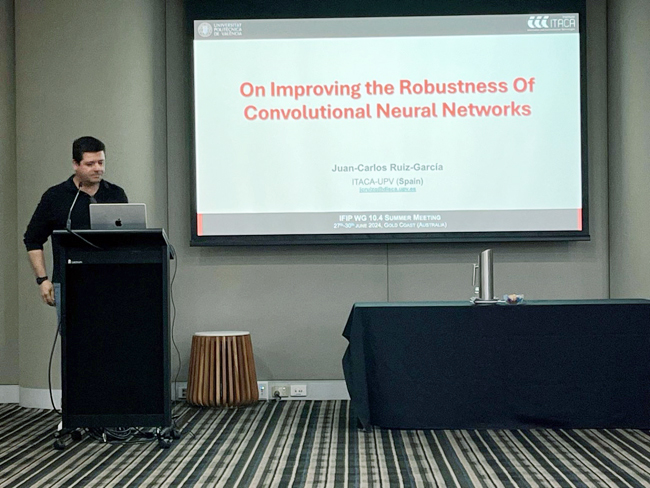Juan Carlos Ruíz, researcher at the Fault-Tolerant Systems Group (GSTF) of the Institute of Information Technology and Advanced Communications (ITACA), participated as a keynote speaker at the ‘2nd International Workshop on Verification & Validation of Dependable Cyber-Physical System (VERDI)’ held on 24 June in Brisbane, Australia.
During his speech, he detailed the main aspects of the innovative method to increase the robustness and secure of convolutional neural networks (CNNs) in critical applications without increasing memory usage.
‘CNNs are essential in areas that require advanced image classification, such as autonomous driving and medical image analysis. To reach high precision in object recognition, high computational power is needed, usually provided by specific hardware accelerators that must be dependable,’ explained the ITACA-UPV researcher.
However, these accelerators are rarely designed to protect the parameters of CNNs during the inference process. This may cause misclassification of objects resulting in unsafe situations that could involve the loss of human lives.
‘As CNNs interconnect with other systems, they are more exposed to malicious attacks that can affect their inference process. Only changing a small number of bits in the network parameters can negatively affect their inference process. Also, as integration scales increase and supply voltages decrease, these parameters are also exposed to accidental alterations that cannot always be easily corrected. This is the case, for example, for autonomous robots used in the exploration of other planets. Currently, solutions based on error correction codes (ECC) to tolerate these failures require spatial redundancy that is not always technically reliable,’ says the UPV professor.
For this reason, his talk focused on his research team’s work on the development of error correction code (ECC)-based solutions to strengthen CNNs against multiple bit faults without requiring additional memory.

“Our work allows us to implement ECC without the need to retrain the network, using proven techniques with zero cost in terms of memory space.” said the ITACA researcher.
Presentation at the ‘86th IFIP WG 10.4 Meeting Summer’.
He used his stay in Australia to attend the ‘86th IFIP WG 10.4 Meeting Summer’ held in Gold Coast, where he gave a prospective presentation of the research work carried out by his group ‘Fault-Tolerant Systems Group’ (GST).
The IFIP WG 10.4 is a world-leading team of experts that aims to identify and integrate approaches, methods and techniques to design, evaluate, validate, operate and maintain secure and reliable IT systems. Presentations at the working meetings of this group are always by invitation.
In the case of Juan Carlos Ruiz, his presentation was entitled ‘On improving the robustness of convolutional neural networks’, and it presented not only the work carried out in this area by ITACA in the DEFADAS national project (PID2020-120271RB-I00). Also he present and future challenges of this type of neural networks for their use in industrial solutions with secure and dependability requirements.
The researcher is currently a candidate for membership of this prestigious scientific group.



